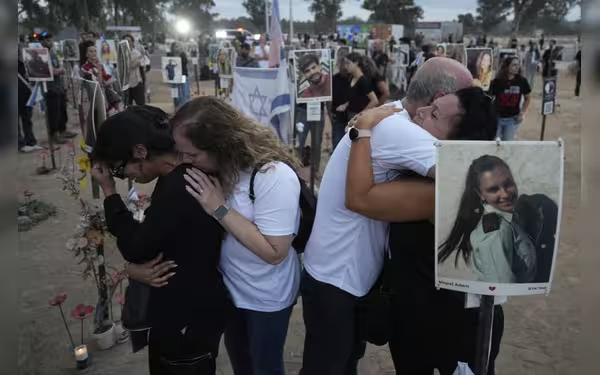Saturday, November 16, 2024 05:45 PM
Iran Vows Retaliation After Israeli Hostage Death
- Iran warns of firm response to Israeli attacks.
- Israel confirms missile strikes from Iran.
- Tensions escalate amid ongoing hostilities.
 Image Credits: arabnewspk
Image Credits: arabnewspkIran threatens retaliation after the death of a hostage in Gaza, escalating tensions with Israel amid missile strikes and military actions.
In recent developments, tensions between Iran and Israel have escalated significantly, particularly following the death of a captive held in Gaza. This situation has drawn international attention, as both nations have exchanged strong words and military actions. The backdrop of this conflict is rooted in a long history of animosity and territorial disputes, which have only intensified in recent years.
On Monday, Iran issued a stern warning, stating that it would respond firmly to any Israeli attack on its territory. Iranian officials emphasized that while they do not seek a broader conflict in the region, they are prepared to defend their sovereignty. This declaration came on the heels of Iran launching approximately 200 missiles towards Israel, marking their second direct assault in a short span of time. The Iranian government claims this action was a retaliation for the targeted killings of militant leaders aligned with Tehran, as well as a general from Iran’s Revolutionary Guards.
In response to these developments, Israel has vowed to retaliate against Iran's missile strikes. Israeli Prime Minister Benjamin Netanyahu characterized Iran's actions as a "big mistake," particularly following the assassination of Hezbollah leader Hassan Nasrallah on September 27. The Israeli military has confirmed that around 200 missiles were indeed fired at their territory, heightening fears of an all-out conflict.
Iran's top diplomat, Abbas Araghchi, reiterated the Islamic Republic's stance during a conversation with his Egyptian counterpart, asserting that they are "not afraid of war" and will deliver a "firm and appropriate response" to any further provocations from Israel. This rhetoric underscores the seriousness of the situation, as both nations appear to be on a collision course.
As the United States engages in discussions with Israel regarding a joint response, Iran's chief of staff has issued a stark warning: if Iranian territory is attacked, they will target Israeli infrastructure. This statement reflects the high stakes involved and the potential for a wider conflict that could engulf the region.
The ongoing hostilities between Iran and Israel serve as a reminder of the fragile nature of peace in the Middle East. As both nations prepare for possible escalations, the international community watches closely, hoping for a resolution that avoids further bloodshed. The situation remains fluid, and the implications of these actions could have far-reaching consequences for regional stability and global security.













